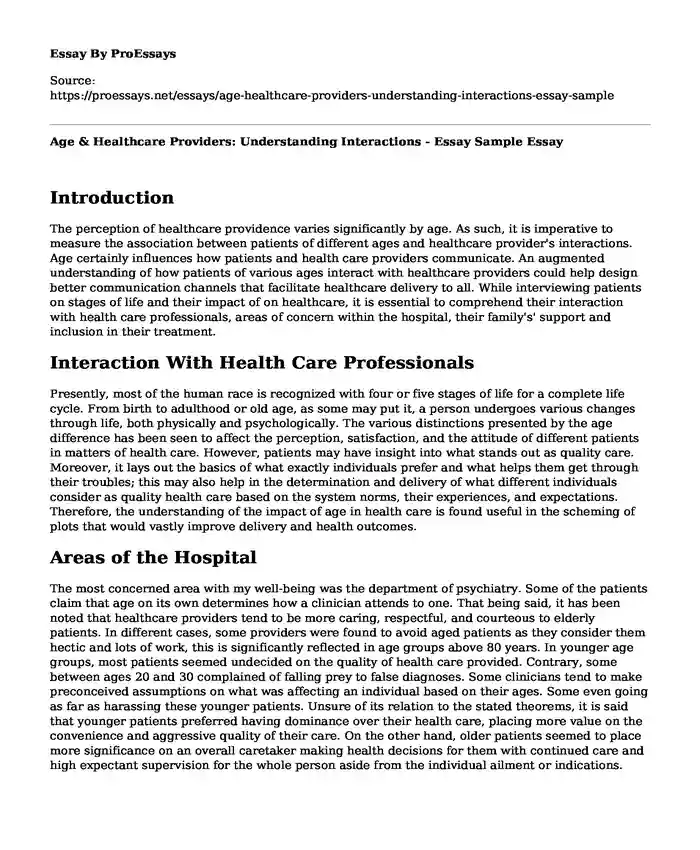Introduction
The perception of healthcare providence varies significantly by age. As such, it is imperative to measure the association between patients of different ages and healthcare provider's interactions. Age certainly influences how patients and health care providers communicate. An augmented understanding of how patients of various ages interact with healthcare providers could help design better communication channels that facilitate healthcare delivery to all. While interviewing patients on stages of life and their impact of on healthcare, it is essential to comprehend their interaction with health care professionals, areas of concern within the hospital, their family's' support and inclusion in their treatment.
Interaction With Health Care Professionals
Presently, most of the human race is recognized with four or five stages of life for a complete life cycle. From birth to adulthood or old age, as some may put it, a person undergoes various changes through life, both physically and psychologically. The various distinctions presented by the age difference has been seen to affect the perception, satisfaction, and the attitude of different patients in matters of health care. However, patients may have insight into what stands out as quality care. Moreover, it lays out the basics of what exactly individuals prefer and what helps them get through their troubles; this may also help in the determination and delivery of what different individuals consider as quality health care based on the system norms, their experiences, and expectations. Therefore, the understanding of the impact of age in health care is found useful in the scheming of plots that would vastly improve delivery and health outcomes.
Areas of the Hospital
The most concerned area with my well-being was the department of psychiatry. Some of the patients claim that age on its own determines how a clinician attends to one. That being said, it has been noted that healthcare providers tend to be more caring, respectful, and courteous to elderly patients. In different cases, some providers were found to avoid aged patients as they consider them hectic and lots of work, this is significantly reflected in age groups above 80 years. In younger age groups, most patients seemed undecided on the quality of health care provided. Contrary, some between ages 20 and 30 complained of falling prey to false diagnoses. Some clinicians tend to make preconceived assumptions on what was affecting an individual based on their ages. Some even going as far as harassing these younger patients. Unsure of its relation to the stated theorems, it is said that younger patients preferred having dominance over their health care, placing more value on the convenience and aggressive quality of their care. On the other hand, older patients seemed to place more significance on an overall caretaker making health decisions for them with continued care and high expectant supervision for the whole person aside from the individual ailment or indications.
Younger Patients
Younger patients have expressed lower satisfaction in health care providence, possibly since most of them echo rather high prospects that are not readily achievable (Haylett, 2019, p. 105). But with more and more familiarity with the delivery of the health care system, these expectations tend to dwindle with time as the patient ages, with a growing increase in their satisfaction. From that, it can be concluded that the relationship between age and patient satisfaction is inversely proportional. However, with continued aging, a patient's satisfaction may deteriorate, considering the likely sprout of more health problems that require more health care services with more strains on the caregivers. The stress posed on the providers may lead to reduced services that fail in the fulfillment of a patient's needs, thus lowering the satisfaction bar further.
Hospital Image
Over the years, patients' fulfillment with their health care providence has proven to paint an intricate association with age. Statistics show that older patients are more content and satiated than different age groups. This inference is mainly based on the fact that the aged, being the fastest increasing section of the population, account for an unequal share of healthcare encounters. Satisfaction scores are shown to peak in the 51- to- 65 years age group, the scores noted to consistently rise with age until ages 65 to 80, after which they decline.
Conclusion
Even though greater satisfaction was associated with quality health across all age sets, the relation amid age and satisfaction was altered by the health status of an individual. The decline in satisfaction, especially within older patients, was found to be more prominent in those individuals with poorer health.
Reference
Haylett, S. (2019). Patient satisfaction with nursing care related to hospital magnet designation. https://www.semanticscholar.org/paper/Patient-Satisfaction-with-Nursing-Care-Related-to-Haylett/12b405c7f94a307e88a92ab16b17ff01f54de8fa
Cite this page
Age & Healthcare Providers: Understanding Interactions - Essay Sample. (2023, Oct 04). Retrieved from https://proessays.net/essays/age-healthcare-providers-understanding-interactions-essay-sample
If you are the original author of this essay and no longer wish to have it published on the ProEssays website, please click below to request its removal:
- Research Paper Example on the Impact of Food Sources on Obesity Risks Among Adults and Children
- Medical Treatment of Uninsured Patients Essay
- Essay Sample on Obesity is a Health Hazard not a Disease
- Research Paper on Obesity in UAE (United Arab Emirates)
- Essay Example on FDA Takes Action to Safeguard Public Health from Radiation Emitting Products
- Research Paper Example on Healthcare Financing: An Overview of U.S. Systems & Networks
- Excellent Clinical Admin & HRM: Quality Care in Modern Medicine - Free Report







